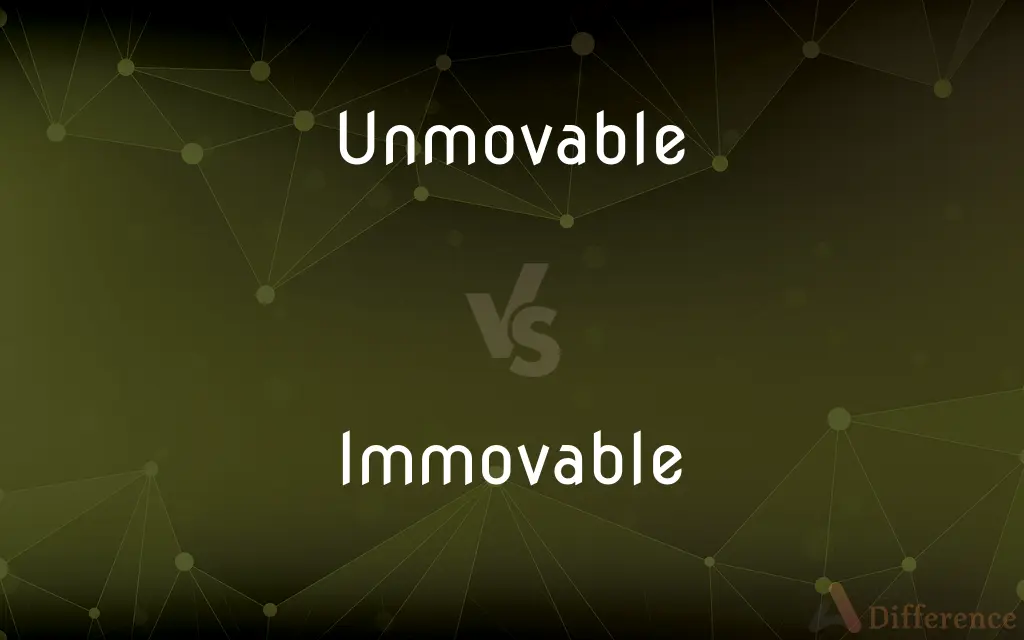Unmovable vs. Immovable — What's the Difference?
By Tayyaba Rehman — Updated on October 17, 2023
Both "Unmovable" and "Immovable" describe something that cannot be moved, with "Immovable" often referring to physical inability and "Unmovable" to resolve or determination. Both suggest stability or resistance to change.

Difference Between Unmovable and Immovable
Table of Contents
ADVERTISEMENT
Key Differences
Unmovable is a term that primarily emphasizes an unwavering stance or determination. It can denote a steadfastness in beliefs, emotions, or decisions. For instance, an individual might be described as "unmovable" in their conviction. On the flip side, Immovable more frequently pertains to the physical realm, suggesting that something can't be shifted or relocated from its position, like a large boulder.
In the realm of linguistics, "un-" and "im-" are prefixes meaning "not." When affixed to "movable," both Unmovable and Immovable appear to convey a similar meaning. However, context provides distinction. Unmovable may lean more towards a metaphorical sense, portraying a steadfast spirit or unyielding attitude. In contrast, Immovable often carries a literal, tangible sense, such as an immovable piece of furniture.
From an emotional perspective, Unmovable captures the essence of someone who remains unaffected by external pressures or influences. Someone might be unmovable in their resolve to achieve a goal, undeterred by challenges. Meanwhile, Immovable can be employed in similar contexts, but its usage often gravitates towards the tangible and physically unalterable, like an immovable obstacle blocking a path.
In legal contexts, Immovable has a specific reference, often relating to property that can't be moved, like land or a building. This usage is distinct and specific. Unmovable, in similar contexts, is less frequent and might not carry the same specialized connotation. Both words, while close in meaning, have nuances that render them suitable for different scenarios.
The nuances between Unmovable and Immovable are subtle. While both can denote an inability to be moved, Unmovable is more flexible, often referring to emotional or mental states. Immovable, with its tangible leanings, is often the go-to for physical contexts, especially in legal terms referring to fixed property.
ADVERTISEMENT
Comparison Chart
Primary Connotation
Emotional or mental steadfastness
Physical inability to be moved
Linguistic Origin
"Un-" prefix meaning "not"
"Im-" prefix meaning "not"
Metaphoric Use
Often used metaphorically
Less frequently metaphorical
Legal Reference
Rarely used in legal context
Refers to fixed property like land or buildings
Common Usage
More flexible in interpretation
More rigid, often literal
Compare with Definitions
Unmovable
Not swayed or influenced by external factors.
His decision was Unmovable despite the criticisms.
Immovable
Unable to be moved or shifted from a place.
The ancient statue was Immovable due to its weight.
Unmovable
Unyielding in emotions or spirit.
Even in the face of adversity, he was Unmovable.
Immovable
Constant and unchangeable in nature.
His loyalty was an Immovable trait, never wavering.
Unmovable
Unaffected by attempts to alter or change.
The sculpture seemed Unmovable, entrenched in its position.
Immovable
Fixed in position, not subject to change.
The boulder was an Immovable landmark in the village.
Unmovable
Displaying a resolute stance or attitude.
She remained Unmovable in her belief in justice.
Immovable
Resistant to physical force or pressure.
The safe was Immovable, even with all their efforts.
Unmovable
Steadfast in conviction or determination.
Her faith was Unmovable, even in challenging times.
Immovable
Relating to property that cannot be relocated, like land.
The law distinguishes between movable and Immovable assets.
Unmovable
Not physically able to be moved.
Immovable
Not able to be moved
All immovable objects have graffiti sprayed on them
Unmovable
Incapable of being emotionally moved or persuaded.
Immovable
(of a person) not yielding to argument or pressure.
Unmovable
Immovable.
Immovable
Immovable property.
Unmovable
Not able or intended to be moved;
The immovable hills
Immovable
Impossible to move.
Immovable
Incapable of movement.
Immovable
Impossible to alter
Immovable plans.
Immovable
Unyielding in principle, purpose, or adherence; steadfast.
Immovable
Incapable of being moved emotionally.
Immovable
(Law) Of or relating to things, such as trees and buildings, attached to real property
Immovable property.
Immovable
One that cannot move or be moved.
Immovable
Often immovables(Law) Things that are attached to real property.
Immovable
Incapable of being physically moved; fixed
Immovable
Steadfast in purpose or intention; unalterable, unyielding
Immovable
Not capable of being affected or moved in feeling; impassive
Immovable
(law) not liable to be removed; permanent in place or tenure; fixed
An immovable estate
Immovable
That which can not be moved; something which is immovable
Immovable
Incapable of being moved; firmly fixed; fast; - used of material things; as, an immovable foundation.
Immovable, infixed, and frozen round.
Immovable
Steadfast; fixed; unalterable; unchangeable; - used of the mind or will; as, an immovable purpose, or a man who remains immovable.
Immovable
Not capable of being affected or moved in feeling or by sympathy; unimpressible; impassive.
Immovable
That which can not be moved.
Immovable
Lands and things adherent thereto by nature, as trees; by the hand of man, as buildings and their accessories; by their destination, as seeds, plants, manure, etc.; or by the objects to which they are applied, as servitudes.
Immovable
Not able or intended to be moved;
The immovable hills
Common Curiosities
What does Unmovable generally imply?
Unmovable often implies emotional or mental steadfastness and determination.
Which word is more flexible in interpretation?
Unmovable is generally more flexible, while Immovable has a more literal sense.
Does Immovable have a legal context?
Yes, Immovable often refers to fixed property like land or buildings in legal terms.
Is Immovable exclusively for tangible objects?
Not exclusively, but it's most commonly used in that sense.
Can Unmovable be used in a literal sense?
While Unmovable can be used literally, it's more frequently metaphorical, describing determination or resolve.
Can Immovable describe emotions?
While less common, Immovable can describe unwavering emotions or traits.
Is Immovable ever used metaphorically?
Yes, but less frequently than Unmovable.
Is Immovable used to describe physical objects?
Yes, Immovable is often used to describe objects that can't physically be moved.
Can an individual's spirit be described as Immovable?
Yes, it can denote an unchanging or unwavering nature.
What's the primary difference between Unmovable and Immovable?
Unmovable often refers to unwavering resolve, while Immovable usually denotes physical inability to be moved.
Are both words interchangeable?
While they have similar meanings, their nuances make them more suitable for different contexts.
Can I use Unmovable to describe a boulder?
While possible, Immovable is more commonly used for such descriptions.
What's the origin of the prefixes "un-" and "im-"?
Both "un-" and "im-" are prefixes meaning "not" in English.
In terms of frequency, which word is more commonly used?
Both are used, but the context dictates preference. Immovable is more common in legal and literal contexts, while Unmovable often appears in metaphorical situations.
Is Unmovable common in legal jargon?
Immovable is more common in legal contexts, especially referring to fixed property.
Share Your Discovery

Previous Comparison
Defendant vs. Plaintiff
Next Comparison
Chili vs. SoupAuthor Spotlight
Written by
Tayyaba RehmanTayyaba Rehman is a distinguished writer, currently serving as a primary contributor to askdifference.com. As a researcher in semantics and etymology, Tayyaba's passion for the complexity of languages and their distinctions has found a perfect home on the platform. Tayyaba delves into the intricacies of language, distinguishing between commonly confused words and phrases, thereby providing clarity for readers worldwide.














































